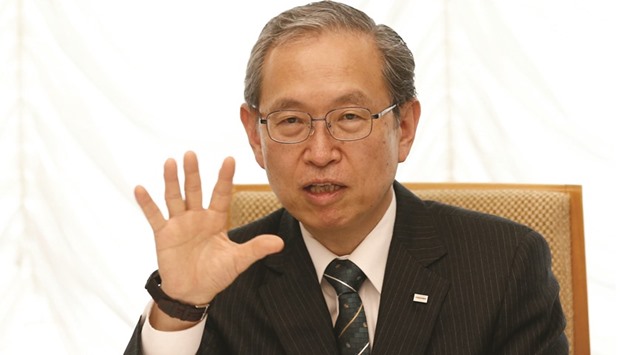Toshiba Corp president Satoshi Tsunakawa, a day after stepping into his new role, cautioned that the company is still recovering from a bruising accounting scandal and faces a lengthy turnaround process.
“We are not even at the halfway point yet,” Tsunakawa said in a group interview in Tokyo on Thursday. “We are still at the mountain’s foothills.”
The Japanese power-to-electronics conglomerate revealed in 2015 its executives had padded profits for years. The scandal claimed the jobs of three presidents, led to record losses and forced it to shrink its empire. While managers at divisions from computers to power plants were found to have overstated profits or delayed booking losses, the medical unit led by Tsunakawa for four years till 2014 was spared controversy.
Tsunakawa now has to win back investor confidence after a 51% plunge in share price last year. Shareholders this week approved his promotion from senior vice president, replacing Masashi Muromachi, who took over as president temporarily in July.
He said his immediate goals were to improve Toshiba’s finances, win back shareholder trust and get the company off a Tokyo Stock Exchange list of securities under supervision. He aims to increase its shareholder-equity ratio from about 6.1 percent now to more than 10% by fiscal 2018.
Toshiba is predicting a return to profit this fiscal year after narrowing the scope of its businesses. The Tokyo-based company agreed to sell its medical unit to Canon Inc and home- appliance division to China’s Midea Group Co.
The fallout continues. Japan’s Government Pension Investment Fund is suing Toshiba for ¥900mn ($8.6mn) in damages, according to Shinichirou Mori, a spokesman for the fund. That’s the amount of money GPIF’s external fund managers lost on Toshiba shares bought seven years ago. The fund is considering suing Toshiba for losses on the rest of its holdings.
Toshiba spokeswoman Yuu Takase confirmed that Japan Trustee Services Bank, which holds the stock on behalf of GPIF, filed the lawsuit but declined to comment further as the case is pending.
Tsunakawa said there were no immediate plans for fund raising. Japan’s Rating & Investment Information Inc ranks the company’s bonds at the lowest investment grade.
“We have to continue winning back investor trust while improving earnings, and earn an upgrade in ratings,” Tsunakawa said.

Tsunakawa: To win back investor confidence after a 51% plunge in share price last year.
